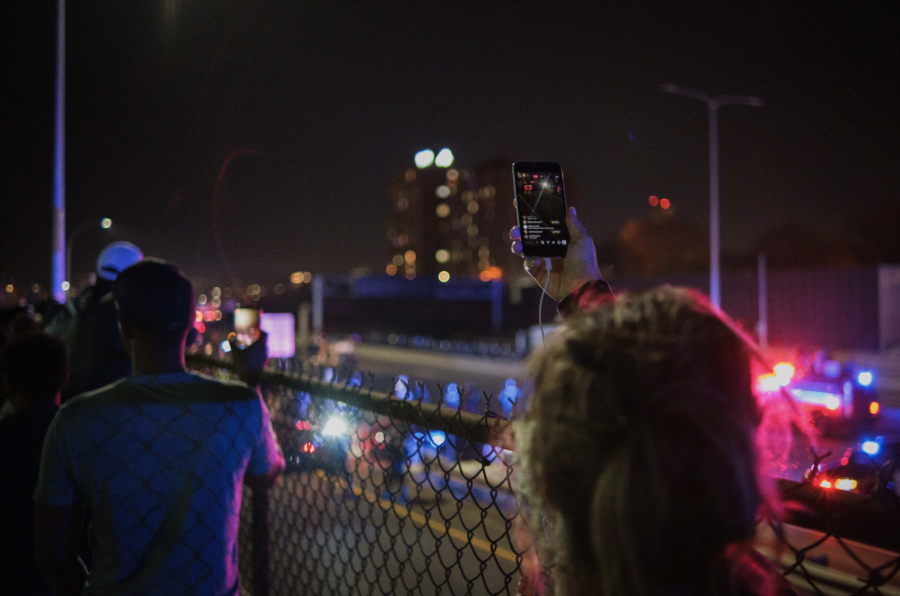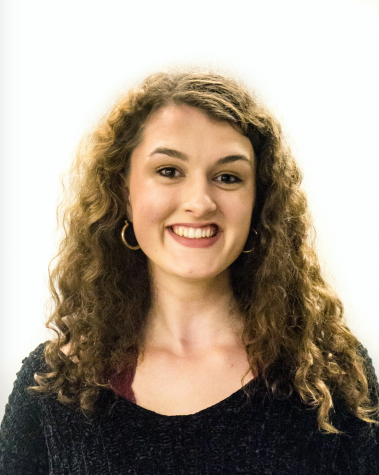Rivera’s support of protesting students makes waves at Mac and beyond
A bystander livestreams from the street overlooking I-94 as Minnesota State police surround and arrest more than 600 people calling for all votes to be counted in the presidential election on the highway below on November 4, 2020. Photo by Kori Suzuki ’21.
November 12, 2020
After protests broke out in Minneapolis on Wednesday night, Macalester President Suzanne Rivera reaffirmed her commitment in a tweet on Thursday, Nov. 5 that if any currently-enrolled students incur fines while engaging in civil disobedience and are not able to afford them, she would be willing to reimburse them.
Her announcement came the morning after hundreds of people, including several Macalester students, were cited for public nuisance and or unlawful assembly after marching in downtown Minneapolis through the Cedar-Riverside neighborhood and onto Interstate 94.
Just about an hour after President Rivera sent the tweet, the St. Paul Pioneer Press covered Rivera’s decision to reimburse students who were not able to pay. After the Pioneer Press published the story, Rivera and her office began to field angry phone calls, emails and even a threat of violence.
Rivera said that the vast majority of messages disapproving of her decision to reimburse students have come from people not affiliated with Macalester, including the person who threatened her office with violence.
“If I were to tally up all of the messages I received in the form of emails, voicemail messages and the responses on Twitter, the vast majority of Mac people were enthusiastically supportive,” she said. “And the vast majority of disapproving people are unaffiliated with Macalester.”
The Pioneer Press story has received 77 comments, and Rivera’s original tweet has received 111, many of them negative and disapproving of her decision to cover student fines. On Nov. 6, the StarTribune published a similar story, with comments turned off. Since the StarTribune tweeted the story it has received 107 comments, many of them negative. On Friday night, Fox News published its own version of the story.
Macalester Public Safety has increased security on campus as a precaution in light of the threat of violence toward Rivera.
“As a precaution we added an extra officer to our evening/night shift,” Macalester Public Safety Director Jim Kurtz wrote in an email to The Mac Weekly. “We will continue to monitor the situation and will add additional public safety staff as long as we feel it’s necessary for the safety of the campus, including our students and staff.”
While the outside response has been rather negative, Macalester students have been overwhelmingly approving of Rivera’s decision. Katie Chin ’22 went to the protest that Wednesday night, and was arrested and cited for public nuisance while walking on I-94 with other protesters.
“I have so much respect for Rivera for supporting her students not just out of some kind of obligation as president of their college but as a supporter of the peaceful civil disobedience, especially in the face of criticism and threats of violence,” Chin wrote in a message to The Mac Weekly.
Chin wrote that she is impressed with Rivera’s commitment. She also appreciated Macalester offering COVID-19 testing to students who participated in election events.
“The majority of law enforcement officers were not wearing masks and even asked us to take our masks off for our mugshots,” Chin wrote. “One of my friends asked if they could stand six feet away to take the picture but they refused.”
“I know there are several people who were uncomfortable with this (myself included) and for the good of the community it would be reassuring if testing were readily available to those who wanted it,” Chin added.
Chin said she was not sure whether she will ask the college to reimburse her for the citation. As of now, she’s not sure exactly how much it will cost.
“I am in a fortunate enough position where I would be able to pay it, and would rather do that if it means Macalester’s fund money would go to someone who needed it more,” Chin wrote.
Rivera said that the funding for reimbursement comes from an anonymous donor who offered the funds after Rivera made her initial commitment to reimburse fines or transportation costs for students who cannot afford them.
“We have not spent one penny on this because not one student has come forward to ask for it,” Rivera said. “What I take that to mean is that students are really thinking deeply about whether they really need it. And if they don’t really need it, they’re not coming forward and asking for it.”
Since Thursday, many people have also expressed their support of Rivera’s decision. Head women’s basketball coach Katie Kollar retweeted the StarTribune’s story with the comment, “I [love] where I work.”
Several alumni have also expressed support. Emily Zimmer ’00 posted about the situation in the Mac Young Macalester Connect Facebook group and asked alumni to call or send emails of support for Rivera to the Board of Trustees. Over 116 alumni have liked the post.
“The Board appreciates an anonymous donor agreeing to provide the funds to reimburse any student who is arrested for engaging in peaceful protest and can’t afford bail,” Chair of the Board of Trustees Jerry Crawford ’71 wrote in an email to The Mac Weekly. “In this era of Covid, we do not want our students in a potentially dangerous environment such as a correctional facility. We also don’t want a situation where students of means can post bail and other students cannot. Both the Board and the college uphold students’ rights to participate in peaceful protest.”
“We have heard from many people about this issue,” Crawford wrote. “The overwhelming attitude within the Macalester Community (Faculty, Staff, Students, Alumni, Parents) has been positive. I can affirm the high confidence we have in President Rivera’s leadership of the College.”
“I wholeheartedly support President Rivera’s decision on the matter of reimbursing fees students may incur while protesting,” Avery Cordingley ’19 wrote in an email to The Mac Weekly. “Protest is a right and not one that should only be reserved for those financially secure enough to cover any fees or fallout.”
Cordingley and some current Macalester students said they see Rivera’s decision as one of many positive decisions during her time as President.
“I only wish I had not graduated just a smidge too early to meet her,” Cordingley added. “One day! But for now, I can follow and support from afar, and this stance is just the latest in a series of excellent decisions President Rivera has made in her time as Macalester President.”
“A government can only be of the people if it hears the people… President Rivera’s decision is a step in the direction of all voices being heard,” Ezra Muthiah ’24 wrote in an email to The Mac Weekly. “This was one of the first decisions she made in her role as president: we have much to look forward to.”
“While she cannot do much to end things like cash bail, as the President of a private college, she is able and, I would argue, obligated to do what she can to protect her students,” Anni Clark ’21 wrote in an email to The Mac Weekly.
Clark added that Rivera’s support for students engaging in protest is just one of Rivera’s impressive qualities.Clark said they and Rivera met on campus for lunch during Module 1 and the two had a chance to discuss their similar backgrounds, specifically, coming from a low-income family. Clark was blown away by Rivera’s openness in discussing her low-income background with them.
“There are so few people who I’ve met in my four years here who have not only shared this specific background, but talked about it openly with me, whether they be students, staff, or faculty,” Clark wrote. “I have certainly never felt seen and cared for this personally and deeply by a member of administration at any school I have ever attended.”
Many have tweeted praise of Rivera, some juxtaposing her positive attitude toward protest with former President Brian Rosenberg’s hesitant attitude towards previous protests, like the Kick Wells Fargo Off Campus movement in 2013.
Jennings Mergenthal ’21 is a history major and has done significant research on the history of Macalester. They have also been part of a few groups to look at Macalester critically and analyze its history.
Mergenthal said that the difference between Rivera’s decision to support students this time and previous presidents’ responses to campus protests is that in demonstrations of past years, like Kick Wells Fargo Off Campus and Fossil Free Mac, “Mac was both the site of as well as the source of the protest.”
“Mac has never had problems encouraging students to protest broader events,” Mergenthal said. “The various antiwar, civil rights and anti-apartheid protests drew generally neutral attitudes from the administration, and were considered to be a part of global citizenship. President Rivera’s offer about student fines incurred during civil disobedience is definitely more explicit endorsement of protest than has happened in a while, but it broadly falls within the historical position towards student protest.”
Mergenthal wrote that in terms of future, on-campus protests at Macalester, a positive response from the Rivera administration would look like “dialogue with the protesters leading to meaningful and substantive change.”
“President Rivera has been almost shockingly willing to engage in dialogue with students,” Mergenthal wrote. “If there is consistently successful and productive communication between students and administration, that might dramatically cut down the need for protest as a response.”
Rivera said that while no on-campus protests have cropped up during her time at Macalester thus far, she would remain firm in her stance of supporting students.
“I don’t think our constitutional rights to freedom of speech and freedom of assembly are limited to only outside the walls of the campus,” Rivera said. “I think that our students choose Macalester because this college values social action, and acting on our principles. And if those principles motivate students to express their perspectives at the college or outside the college, either way, I affirm their right to be heard.”














John Gaylord • Nov 13, 2020 at 1:45 pm
I think this article falls short of a satisfying discussion of this issue. There are several angles that could be explored – related to moral hazard, consistency, fairness, stewardship, etc.
Perhaps most fundamentally though, why didn’t Dr. Rivera pledge her own money to pay the fines? I suppose many complainants assumed she was using Macalester money, so she made sure to clear that up. But why rely on an anonymous donor for such a deeply-felt belief? The cost to her would have been minimal (or none) and the principle would have been convincingly demonstrated.